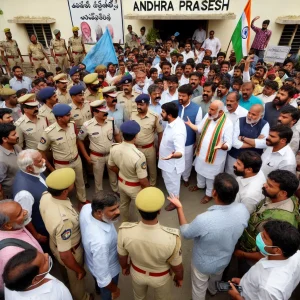
Amaravati: Andhra Pradesh Chief Minister and Telugu Desam Party (TDP) chief Chandrababu Naidu has stirred controversy with his recent statement advocating the need to learn Hindi. At a time when several regional states are resisting Hindi imposition, Naidu’s stance has raised questions about whether this is a pragmatic approach or a political maneuver in alignment with the BJP-led NDA.
South India’s Resistance to Hindi Imposition
For decades, southern states have strongly opposed the imposition of Hindi to protect their linguistic and cultural identity.
- Tamil Nadu has rejected the three-language policy and continues to emphasize Tamil and English.
- Karnataka has witnessed protests against making Hindi compulsory in banking and railway services.
- West Bengal has taken a firm stand on ensuring Bengali’s prominence in governance and education.
In this backdrop, Naidu’s pro-Hindi stance appears out of sync with the broader sentiment of South India, where leaders actively fight for linguistic autonomy.
Does Hindi Threaten Regional Languages?
The growing push for Hindi has already impacted several regional languages, many of which are now on the verge of extinction.
- UNESCO has listed multiple Indian languages as endangered, warning against policies that favor one language over others.
- States like Bihar and Uttar Pradesh have seen languages like Bhojpuri, Maithili, and Awadhi gradually pushed away from mainstream education.
- Tamil Nadu’s IT Minister P. Thiaga Rajan has raised concerns that even implementing a two-language policy is difficult in many states, let alone three.
If this trend continues, India’s rich linguistic diversity could be at risk, impacting cultural identity and regional heritage.
Why Not Prioritize English Instead?
Naidu’s statement brings up a key question:
If a common language is essential for national unity, why not prioritize English instead of Hindi?
- English is already the preferred medium for education, business, and diplomacy.
- Unlike Hindi, which is largely limited to the northern states, English serves as a neutral language that connects India globally.
- Proficiency in English enhances job opportunities and international collaboration, whereas Hindi’s reach remains domestic.
If the goal is to empower youth with a widely accepted language, English should be the natural choice, not Hindi.
Naidu’s Political Alignment with BJP?
Naidu’s timing and positioning on the Hindi issue raise political concerns.
- The BJP has long advocated for Hindi as India’s national language and pushed policies favoring its dominance.
- As TDP’s key coalition partner in the NDA, Naidu’s endorsement of Hindi seems to align with the BJP’s linguistic agenda.
This has led to speculation that Naidu’s move is politically motivated, possibly aimed at strengthening ties with the BJP rather than reflecting the actual linguistic needs of Andhra Pradesh.
Southern States’ Fears Over Delimitation
Naidu’s stance also comes at a time when South India is concerned about losing political influence due to the upcoming parliamentary delimitation process.
- The redistribution of parliamentary seats is expected to favor Hindi-speaking northern states, reducing the representation of the South in national politics.
- The push for Hindi dominance, combined with delimitation concerns, has led to fears that South India’s political weight is being systematically diminished.
With these factors in play, Naidu’s pro-Hindi stance could further alienate the regional sentiment in Andhra Pradesh and neighboring states.
Conclusion: Development or Political Move?
Chandrababu Naidu’s advocacy for Hindi is not just a linguistic statement—it is a strategic political move that aligns with the BJP’s long-term vision.
At a time when other South Indian leaders are fiercely defending regional languages, Naidu’s position risks alienating people in Andhra Pradesh who see linguistic identity as a crucial aspect of their culture.
With delimitation on the horizon, a Hindi push over regional languages or English could deepen cultural and political marginalization in the South.
The question remains: Is Naidu genuinely advocating linguistic progress, or is he echoing the BJP’s larger agenda?




